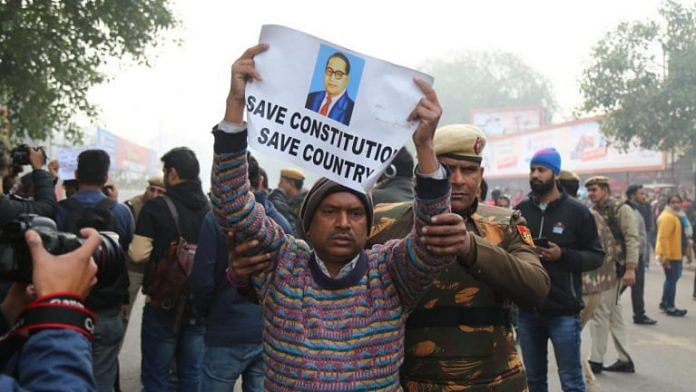Slogans are the chariot of a political movement that carry politicians to the temple of governance and have been used to sway the mood and opinion of people across the political spectrum worldwide.
Communication has been a key instrument between the people of the land and the aspirants of government formation, and slogans help bridge the gap. The power of slogans arises from the simple fact that a few words can topple governments, inspire masses and bring about a revolution. A slogan crystallises a collective idea that resonates with the people.
They say “action speaks louder than words”, but in politics, slogans have allowed politicians to rephrase it to “words speak louder than actions”.
The word ‘slogan’ is derived from the Scottish Gaelic ‘sluaghghairm’, meaning a clan’s battle-cry. The success of a slogan depends on the emotion it can arouse in the masses.
Another important factor is brevity — the briefer the slogan, the easier it is to remember and repeat. A good slogan perfectly compresses the broad and complex agenda or ideology of a political party into a simple phrase.
The transcendence of slogans beyond their political and personal nature has been a frequent occurrence as the accumulated power exuded by these mere words find deeper and greater assimilation in public life.
How slogans evolved in India
Beginning with some of the most prominent ones from the pre-Independence era, let us understand how slogans have evolved in India.
“Jai Hind” — the battle outcry given by Netaji Subhash Chandra Bose was adopted as a national slogan in India after 1947. Today, the slogan has no political boundaries, as we have grown up hearing it in events ranging from our school functions to political rallies.
Another slogan, “Vande Mataram”, coined by Bankim Chandra Chattopadhyay, was used as a patriotic salute and a war cry.
Sometimes, it takes more prominent public figures to popularise a slogan. An example is “Inquilab Zindabad”, which was made famous by freedom fighter Bhagat Singh but was originally coined by Urdu poet Hasrat Mohani in 1921.
When you want to challenge an authoritarian figure, a slogan is a chief tool to gather the masses. Lala Lajpat Rai opposed the Simon Commission of 1928 with his slogan “Simon Go Back”, which infuriated the British so much that it provoked them to attack the peaceful rally. Today, people across the political spectrum have adopted the slogan with their own modifications to protest.
In 1965, Lal Bahadur Shastri gave the famous slogan “Jai Jawaan, Jai Kisaan” during the India-Pakistan war, which has been used by the farm law protesters to rally for their demands.
Perhaps, Atal Bihari Vajpayee transformed Shastri’s slogan to its most effective form for “developing India” with “Jai Jawaan, Jai Kisaan, Jai Vigyaan”.
In 1971, two words — “Garibi Hatao” — by Indira Gandhi saw her gain a sweeping victory, and also sowed the seeds for her version of socialism in India. All these examples clearly demonstrate the long-lasting impact that slogans create, and how they can be easily adapted, adjusted, manipulated, or misconstrued to meet certain political agendas.
Fast forward to 2014, the juggernaut of Modi-Shah got a landslide victory riding on the back of a series of slogans like “Ache din aane wale hai”, “Abki baar, Modi sarkaar”, “Mandir wahi banayenge”, “Naa khaunga, na khaane dunga”, etc.
BJP’s 2019 election rallies also primarily used a rejigged avatar of the 2014 slogan as — “Phir ek baar, Modi sarkaar”. Today, the Opposition uses the altered forms of their slogans to target PM Modi on the failed promises.
Slogans from Bengal
In 2021, the scorching political battle for West Bengal, probably the most intense since the Battle of Plassey, was fought between the BJP and the TMC.
TMC’s slogan for the election — “Khela Hobe” — created shockwaves across the state as well as the country. It proved that proper channelisation of words and planning can perforate Modi-Shah’s unfathomable success mantra.
The “Khela Hobe” slogan has given hope to other opposition parties of India, which is evident from the fact that parties like the Samajwadi Party are using a local translation of the slogan, Khela Hoi, to fight the Yogi government.
Every opposition party in India now wishes to emulate Mamata’s success with this slogan.
This is the power of slogans in Indian political discourse. They have evolved from helping India gain independence to masking real issues like education, employment, poverty, etc., and replace them with futile matters.
India’s journey from “Jai Hind” to “Khela Hobe” is extremely fascinating and shows how Indian politics has evolved.
However, other countries are equally guilty of toxification of the power of slogans. The acceptance of a particular party’s slogan shows which party was able to sway the mood of the people, instead of reflecting what is truly on their minds.
Political slogans were originally supposed to sway people on the basis of emotion, reason, and credibility. Sadly, reason and credibility have been missing. We must file an FIR (Find, Investigate and Research) before it’s too late to find them.
Arghyadeep Das is a student of K.J. Somaiya College of Engineering, Mumbai



